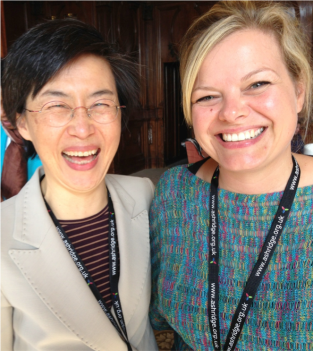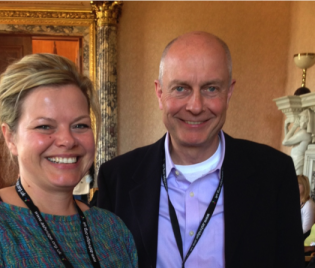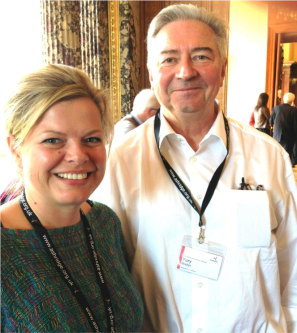Meeting of world leaders in action learning

What are we Learning Across the World? Connecting and Disrupting our Practices
In April 2014, Genevieve Cother attended the 4th International Action Learning Conference in Hertfordshire, UK, on behalf of the Action Learning Institute. Our objectives for attending the Conference were to gather information about action learning programs worldwide; gain an understanding of the global action learning community; seek out practitioners with similar or relatable approaches; and identify theory or practices, which could be applied to enhance our program.
Our Director, Bob Cother, has also conducted a literature review and many of the authors reviewed attended or presented at the Conference.
The theme of the Conference was aimed at applying the principles of reflection to disseminate the group learning of the action learning community world-wide. In particular, the focus of this reflection was applied to the sub-themes of:
1. Action learning across the world
2. Beyond the Revans’ Legacy/Hegemony
Action learning researchers and practitioners world-wide are familiar with the underlying principles of Reg Revan’s pioneering work in this field. In their research and practice, there are opportunities to apply Revan’s theory for different situations incorporating local language, culture and the individual personalities and abilities of action learning participants. Revans theory supports self-organising action learning, which relies upon the group (referred to as an action learning ‘set’) to self-organise rather than rely on external influences (eg. facilitators) to provide a formal framework for learning.
Therefore, the Conference theme aims to bring together diverse examples of research and practice to observe how Revan’s theory is applied, developed and challenged, and reflect on the results achieved.
Conference highlights
The Conference spanned 4 days and 40 sessions including workshops, seminars and facilitated discussions. Topics covered included a range of Accounts of Practice and Refereed Papers across eight sub-themes. The following are a small selection of presenters and an overview of their presentations. A full account is published in the Conference edition of the Action Learning: Research and Practice journal.

Genevieve with Michael Marquardt of the World Institute for Action Learning (WIAL)
Michael Marquardt
‘Coaching that Empowers Action Learning’
Dr Michael Marquardt is the founder of the World Institute for Action Learning (WIAL). WIAL have a range of certifications that they offer and these are highly regarded within the action learning community. Marquardt’s approach to action learning is more facilitator-centred (as opposed to self-organising) and reflects the corporate world in which he operates. Marquardt has had demonstrated corporate success in the US (eg. Microsoft, Sony Music, Constellation Energy) and embraces the facilitator as a necessary element of action learning. The Facilitator’s role includes managing the personalities and learning styles of participants. This includes assisting those who find it difficult to speak up and participate in the action learning environment, and may include managing more dominant members to allow other participants to explore their own ideas.

Genevieve with Mike Pedler and Christine Abbott from the Centre for Action Learning Facilitation
Mike Pedler and Christine Abbott
‘On Stopping Doing those Things that are not Getting us to Where we Want to be: Unlearning, Wicked Problems and Critical Action Learning’
Pedler and Abbott are the founders of the Centre for Action Learning Facilitation (c-alf). Their work includes Facilitating Action Learning: A Practitioner’s Guide, a practical approach to optimising action learning. Pedler and Abbott advocate taking a whole systems approach to wicked problems and using critical action learning as a tool for ‘unlearning’ conventional (linear) approaches to analysing problems (eg. cause and effect).
C-alf delivers the internationally recognised Professional Action Learning Qualification in partnership with the Institute for Leadership and Management as a level 5 Qualification. This qualification bears many of the same characteristics of the Certificate IV in Training and Assessment program offered by the Action Learning Institute as Facilitator Action Learning and we hope to be able to offer this as a dual qualification in the future.

Genevieve with Asst. Professor Yon Joo Cho from Indiana University
Yonjoo Cho
‘Comparing Project-based Learning and Action Learning in Education’
Yon Joo Cho is best known for her work with Professor Hyeon Cheol Bong (see literature review) however Cho presented the design and early results of her research into project-based learning in schools. Cho’s research explores the distinctive features of project-based learning (PBL) and action learning used in education, and then seeks commonalities and differences.
Cho’s work is of great interest to us as it is the only example of action learning applied to curriculum based education that we have encountered thus far. PBL has been successfully used in schools to achieve and verify competencies against curriculum and PBL shares some features of action learning. The key difference between PBL and action learning is that PBL centres on the individual as compared with action learning, which focuses on the problem. This resonates with the regulatory aspects of our programs, which must comply with the Australian Qualifications Framework. Herein lies the challenge of adhering to the Revans principles of self-organisation while ensuring all participants in a set achieve competency against performance criteria.

Genevieve with Professor Bernhard Hauser of Bernhard Hauser Consulting (bhcg) Munich
Bernhard Hauser
‘Is there an Initial Barrier to Action Learning – and if so what can you do about it?’
Professor Bernhard Hauser presented a work in progress report of a study conducted on students in Bachelor and Masters programs at the University for Applied Management in Erding, Germany.
Hauser described the difficulties encountered in promoting action learning based on data collected at the beginning, half-way and ending of programs conducted using an action learning model. The data showed that early scepticism was replaced with positive assertions of the effectiveness of the process. This infers that marketing action learning programs to those inexperienced in action learning may be futile and that programs must develop organically via word of mouth.
Professor Hauser also presented an alternative structure for remote action learning using web-based collaborative tools. The remote model includes a series of face-to-face meetings with real-time online sessions conducted in between. This is something the Action Learning Institute has been exploring for some time. Remote assessment and mentoring for on-site Facilitators is currently being trialled and Professor Hauser’s program is a good benchmark for our own work in this area.

Genevieve with Professor Yuri Boshyk of the Global Executive Learning Network
Yuri Boshyk
‘Reassessing the Life, Work and Legacy of Reg Revans in Light of New Sources and Developments’
Professor Yuri Boshyk is well-known in the action learning world as the unofficial biographer for action learning pioneer, Reg Revans. Boshyk presented a preview of his latest work, situating Revans’ life and work in the broader context of the rise and proliferation of organisational development. Boshyk shared his insights into the influence of Revan’s early life, his pacifism influenced by his Quaker upbringing, his rejection of ‘experts’ and his eventual alienation from academic discourse. Boshyk’s previous works include Action Learning History and Evolution (Palgrave Macmillan 2010), which includes detailed analysis of the legacy of Reg Revans. Revans is presented as a very complex and somewhat enigmatic person, his dislike of academic discourse is sometimes perceived as an inability to accept criticism however it is possible that he was encouraged, and even influenced, by the people around him at the time.
Sonja Antell and John Heywood
‘Exploring the challenges in scaling up the delivery of action learning facilitator training (ALFT) within a global organisation’
Sonja Antell and John Heywood, from Action Learning Associates, presented a workshop on the challenges of training action learning facilitators in the global arena. Action Learning Associates have trained over 140 action learning facilitators from different countries, languages, cultures and professional backgrounds. Facilitators are trained to facilitate action learning sets within their own companies to promote innovation and tackle real problems.
Antell has been working with an international company for 2 ½ years, to deliver a global “First Line Manager Programme” (FLMP). This program will see the First Line Manager of each manufacturing cell competent to lead their own team in an action learning project.
Antell and Heywood describe their work as rewarding, particularly when participants are able to feedback results from the application of their training. Of particular interest to us is the focus on manufacturing and particularly shop-floor employees rather than executive level as most of the other programs presented are couched in terms of leadership and management.
Wyn Owen
‘Longitudinal Mixed Measures – one approach to evaluating Action Learning’
Wyn Owen from Menter a Busnes presented the design and early results for his research, which aims to provide data for the evaluation of action learning. A gap exists in the research on action learning in that empirical data is extremely difficult to qualify.
Owen’s research is based on the 700 participants in the Agrisgôp program delivered by Mentr a Busnes. Agrisgôp is a Management Development programme for farming businesses in Wales. Established in 2003 Agrisgôp aims to develop management capabilities of farm operators and more viable and sustainable businesses.
The Agrisgôp model is a self-organising action learning set with a community member taking on ‘lead horse’ role. The program has had significant success particularly in increasing the capacity and resilience of farming businesses. This model is similar to the programs delivered by the Action Learning Institute in that the projects are clearly scoped and target an area of real importance to the group.
Conclusions
Action learning programs worldwide
The programs encountered thus far focus mainly on facilitator training and do not include the implementation of any planning or recommendations emanating from the action learning process.
There are no known examples of action learning being used to deliver recognised qualifications.
International qualifications are available for action learning facilitators, however qualifications do not exclusively use action learning as a teaching method and are not always recognised internationally.
The global action learning academic community
The community is active and collegiate however there is a lack of practitioner engagement. Those identifying as Practitioners are often delivering programs in facilitation and therefore are ‘one step removed’ from the action learning process, as applied in the workplace. Practitioners are generally working at an executive or middle-management level where action learning is used as a leadership or management tool.
There is a large gap in empirical research into assessment and evaluation of outcomes of action learning.
Relatable examples of practice
Yonjoo Cho’s work on project-based learning has provided another perspective on action learning and curriculum-based qualification. Cho’s analysis of the features of action learning as compared with project-based provides a basis for analysing our own programs against both approaches and identifying opportunities for improvement.
Wyn Owen and Agrisgôp are an excellent example of the strength of action learning in creating innovative micro-clusters. The process of tackling a shared problem or implementing shared ideas promotes relationships, trust, and in many cases, the sharing of resources, particularly in a regional area. Agrisgôp also demonstrates the importance of implementation in order to extract real learning i.e. learning by doing.
Sonja Antell and John Heywood and the First Line Manager Programme are relatable to the Action Learning Institute programs in that they target workers at the front line of manufacturing. Although our programs may be applied at a range of levels within an organisation, it is important that those dealing directly with the problem at hand are involved in the planning and implementation of solutions.
Identify theory or practices, which could be applied to enhance the ALI program
The Conference highlights opportunities to enhance the programs offered by the Action Learning Institute and as well as our business processes. In brief these include:
- Strategies for promotion to overcome early scepticism
- Defining the role of the facilitator with consideration for the Pedler and Abbott, WIAL, and Revans models
- The introduction of action learning sets (cohort meetings) during the implementation phase of projects
- Greater engagement and collaboration at the executive level of participating organisations
